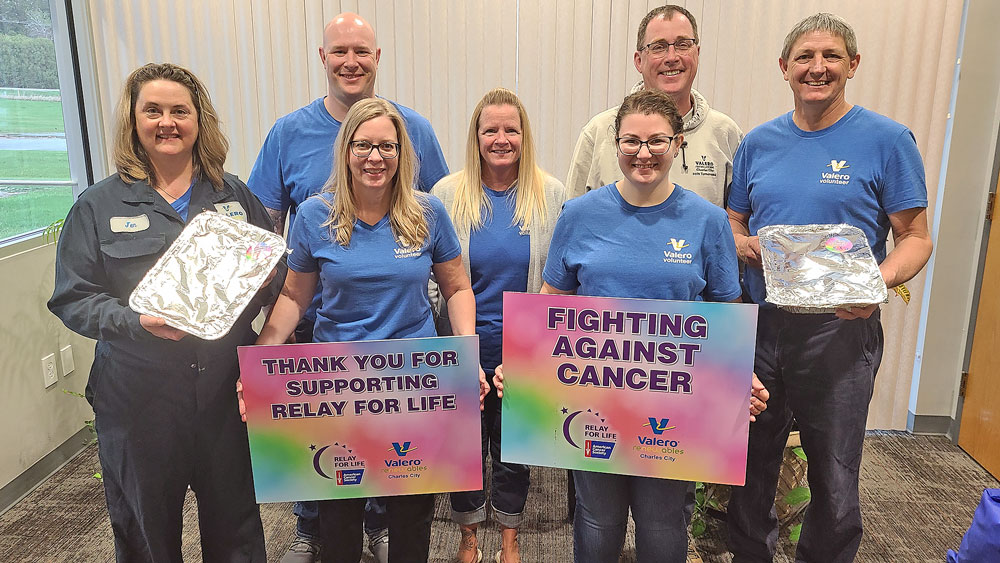SHIIP program at FCMC helps seniors choose health care options to save money

By Kelly Terpstra, kterpstra@charlescitypress.com
Sometimes choosing the right senior drug coverage plan can be a confusing and complicated decision.
Joan Lore feels your frustration.
“If we had kept all the mail that we had gotten from different drug companies or insurance companies about all the different plans available, we could have filled a big box,” said Lore.
That’s why she took the initiative to educate herself and find out more about the Medicare options available for people over the age of 65. That led her to becoming an informed volunteer and consultant for the Senior Health Insurance Information Program (SHIIP) at Floyd County Medical Center.
Lore, along with other volunteers who are overseen by SHIIP Facilities Director Shanelle Harken, provide Medicare patients with confidential and objective individual counseling that not only helps find the right plans and options, but can save them substantial money.
“People are just inundated with so much information that they absolutely have no idea what it says or what it means,” said Lore.
The SHIIP program has been offered at FCMC since 1997, according to Lore.
SHIIP volunteers are available by appointment only, by calling 641-228-6830, and they also help with free 2½ hour seminars that explain the benefits and plans offered by Medicare.
Lore, a retired registered nurse for FCMC with almost 50 years of experience working in the medical field, helped save over half a million dollars for 900 patients who signed up during the annual open enrollment period last year.
“That’s a lot of money going back into the Charles City economy,” she said.
The annual open enrollment period for Medicare when people can switch Medicare Advantage (Part C) or prescription drug (Part D) plans runs from Oct. 15 through Dec. 7.
Lore said the biggest part of her job as a SHIIP volunteer is changing drug coverage plans during the open enrollment period. Once that December deadline has passed, clients can’t change their plans until the open enrollment.
“They’re stuck,” said Lore.
Lore also said what is covered and not covered by health maintenance organizations (HMOs) can change year to year.
She said she saw roughly 60 percent of her clients change their plans three or four years ago. The other 40 percent stuck with their current health plans. Fast forward to the present day and Lore said the clients she will see that come back every year to change their plan will be in the 80 percent range.
“In September I think the drug companies go, ‘We’re just fruit basket upset and change everything. We’re not going to cover this inhaler but we’re going to cover this one.’ They’re the same medicine, but they’re just different names,” Lore said.
Ron James, the chief financial officer at FCMC from 1983-2013, is also a SHIIP volunteer who donates his time to help paint a clearer picture for patients who often can’t afford the rising costs of prescription medications. He said coupling that with yearly premium changes and it’s easy to see how people can get overwhelmed.
“There’s just so many aspects of Medicare that is so confusing – even to people like us that have been trained on it. To keep it all straight is next to an impossibility. So the common person has no idea,” he said.
James said some clients have 15 to 20 different drug prescriptions and Medicare has 28 drug plans available. Choosing the wrong coverage plan or missing the deadline for the open enrollment period can be devastating to one’s finances.
“Generally around here, they’ll get the care. The problem is, if they don’t do it properly, they have to pay for it. It can break you in a hurry,” said James.
Lore said Medicaid patients can also get frustrated after turning 65 — the age when Medicare coverage can take over. Low-income clients often can’t afford losing Medicaid.
“They lose a lot of their benefits. The whole income structure’s different if you’re less than 65,” said Lore.
James said the SHIIP program sees about 200 patients every month. Each appointment can take about an hour or a little longer. Volunteers analyze the plans for the patients and give recommendations.
“They make the pick. We can not tell them what to do,” he said. “If they want to pick a plan that costs more, that’s their choice.”
James said every year there’s usually adjustments to the program or something added to the open enrollment period that volunteers and patients will each have to get used to.
Last year it was the Senior Medicare Patrol (SMP), which helps detect and stamp out fraud or abuse of the health care system.
James said people should never give out their Medicare number to anyone unless there is a valid reason to do so.
“If a scammer gets a hold of your number they can use it to do whatever they want with it,” said James.
Phone call scams are also on the rise that target those who are 65 years of age and up. That’s why James said patients should review their explanation of Medicare benefits every month.
“Did you see that doctor? Did you have that test done? Is it you or somebody else billing under your number?” said James.
Lore mentioned instances of patients receiving medical braces that arrived at their doorstep that they never ordered.
“If it looks fishy, report it to us and we’ll report it on,” said James.
The U.S. General Accounting Office estimates that $1 of every $7 spent on Medicare is paid inappropriately due to errors, fraud and abuse. It is estimated that $60 billion is lost each year nationwide to Medicare fraud, according to the Iowa Insurance Division.
Also new this year for the program is patients need to create a username and password to access their drug plans online. This can be problematic for patients who may not know how to navigate a computer.
“When you’re dealing with people that are 70 and 80 years old, you talk to them about a username and password and you get this stare,” said Lore. “My dad’s 93. He’s never touched a computer in his life.”
James said the volunteer staff will ask each patient if they have permission to help them with setting up their online accounts so they can get started with their own specific coverage plan.
The SHIIP program is sponsored by the Floyd County Medical Center and has added two volunteers this year to a staff of three a year ago. This is Lore’s fourth year of volunteering and James’ third. Linda Lindaman, Linda Toppin and Kathy Behrens comprise the rest of the SHIIP volunteer staff.
“It’s a service the hospital provides for the community,” James said. “All our time is free.”
Go to shiip.iowa.gov for more information regarding SHIIP, or if you are interested in becoming a SHIIP volunteer.







Social Share